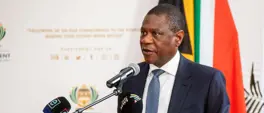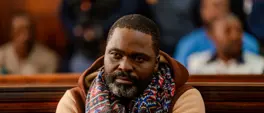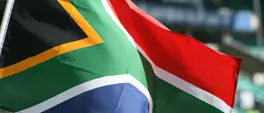YONELA DIKO: For the ANC to survive, it must let the SACP go
Yonela Diko
4 September 2024 | 9:21Over the years, the battles between the ANC and SACP have only intensified, with accusations and counter-accusations that always potrayed a relationship in paralysis, writes Yonela Diko.
In 1994, then-deputy president, Thabo Mbeki wrote a paper entitled "From Resistance to Reconstruction: Tasks of the ANC in the New Epoch of the Democratic Transformation - Unmandated Reflections", which now on reflection, captures all the challenges the African National Congress (ANC) would encounter on its governing journey, even if the players in his prophetic theatre have come from more fronts than he predicted.
On the back of pragmatic policies the ANC had to adopt in 1994, captured succinctly in the Ready to Govern document, and the global reality that the ANC could not escape, Mbeki foresaw ”forces” that would try to ”destroy the ANC from within [and] create contradictions and conflict between the ANC and other formations in the democratic movement”.
Although Mbeki foresaw these forces attempting to "encourage the SACP [South African Communist Party] to project itself publicly as the ”left conscience”, and the Congress of South African Trade Unions (COSATU) to be "encouraged to project the pursuit of political and socio-economic objectives different from those the ANC had set itself as a governing party", to an extent, the coalescing of these forces is how Mbeki was removed from office.
This prophecy was uncanny.
Mbeki also saw a time in the short horizon where these forces would attempt to ”split the ANC around the issue of leadership”
In response to this, Mbeki was clear that such changes would also "demand that the ANC and the democratic movement as a whole should be able to shed some of its ‘members’, regardless of how this might be exploited by our opponents to discredit the movement.”
While Mbeki might have anticipated that the shedding of these members would likely be an ANC letting those partners who saw ANC's governing choices as a threat to the ideological left, he may not have foresaw that these forces would mount an offensive against Mbeki himself in an attempt to remove him from leading the ANC, in order to attempt at full control of the governing party.
The shedding of Mbeki and those loyal to him had a seismic effect on the organisation, but because the ANC was moving from its strongest political position to date, it was able to withstand that shock with limited damage.
However, it was the first slavo to a disaster lurking on the horizon.
The SACP and COSATU, however, remain valuable members of the alliance, but their battles with Mbeki on ideological grounds created an opportunistic window for what Mbeki called "charlatans, who engage in fake revolutionary posturing and promise everything that is good, while we all know that these confidence tricksters are telling the masses a lie.”
Unfortunately, these charlatans actually come from inside the ANC.
ANC AT A POLICY CROSSROADS
The ANC's pragmatic policy choices from 1994 forced the party to be moderate in its governing approach, presenting a conundrum for itself and its alliance partners.
The SACP, which felt a threat to its left-leaning identity as the ANC, moved closer and closer to the centre, particularly when the ANC introduced its Growth, Employment, and Redistribution (GEAR) policy.
It did not help that the ANC was unwilling to compromise on policies it thought were good for the country and for economic growth.
Over the years, the battles between Mbeki and SACP only intensified, with accusations and counter-accusations that always potrayed a relationship in paralysis.
The SACP found Mbeki's leadership style authoritarian and prone to marginalising SACP leaders within the ANC, and Mbeki always wanted to let the SACP know the door was wide open, as the ANC was not a socialist party pursuing a socialist revolution.
During the SACP and Mbeki spat, a new battlefront for Mbeki was opening between him and his then-deputy, Jacob Zuma.
Rumours of a corrupt relationship between Zuma and Shabir Shaik were already running amok in the early 2000s. These rumours were enough to force the National Persecuting Authority (NPA) to investigate Zuma. The NPA would find a prima facie case against Zuma, which it chose not to prosecute.
Already aware that Mbeki did not consider him a capable leader or worthy successor, and feeling marginalised as a Deputy President, Zuma decided to turn his personal legal battles into a political prosecution.
It is here that the group that felt marginalised by Mbeki, first the SACP and now Zuma, found each other.
What Mbeki had predicted as forces attempting to ”split the ANC around the issue of leadership” finally manifested, and this time, as Mbeki had partly predicted, the SACP was a driving force.
Although the SACP chose to fashion their Zuma support as ideological, no one knew exactly what Zuma's colours were ideologically.
As associate Wits sociology professor Devan Pillay aptly put in his analysis of Zuma, "within the SACP [there] are both those who see Zuma as the 'vehicle of sweeping change' and those who just 'hope and pray' that Zuma will support left policies."
It is this hope and prayer that Zuma is the 'last hope for the working class' that made the SACP and COSATU to throw its weight behind Zuma and deliver him to the Union Building in 2009.
It was a huge gamble, the consequences of which were catastrophic.
Zuma had not a socialist or working class bone in his body; he just wanted to solve his financial problems and make his family and friends rich.
The SACP's obsession with its fake anti-neoliberal and capitalist posture has led them to desperate leadership choices, and instead of learning from its past mistakes.
Unfortunately, Zuma has taken the window the SACP cracked open to be packaged as a leader of the working class, which was used it to split the ANC and create his own fiefdom in the uMkhonto weSizwe (MK) Party, where he is finally building a personal refuge for protection and self-enrichment - the only thing Zuma has ever cared about.
No one has ever known what ideological or policy positions Zuma stands for until SACP gave him his identity. Zuma has used that to attempt to run the State to the ground.
If ANC is to survive, it must let the SACP go.
Yonela Diko is the former spokesperson for the Minister of Human Settlements, Water and Sanitation.
Get the whole picture 💡
Take a look at the topic timeline for all related articles.















